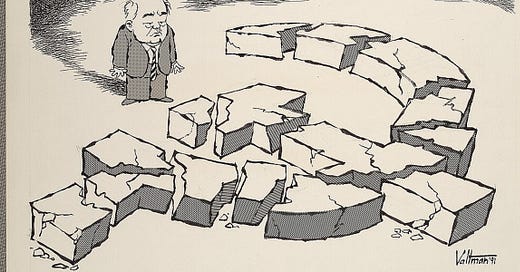I’ve said very little about the Ukraine conflict because I do not have strong opinions about it and do not feel it’s wise to entangle our identitarian messaging with the complex, generational challenge that’s ultimately a lingering artifact of the poorly dissolved Soviet Union. The more I speak on the matter, the fewer friends I’ll have, but I feel a short post is obligatory to preclude what people will presume I’m thinking on the matter.
The breakup of the Soviet Union was a modern Treaty of Versailles, leaving large populations of Russian people beholden to governments that largely define themselves in opposition to Russian heritage and identity. Many are hopelessly entangled as minorities in states that are no longer theirs, and repatriation is the best alternative for them. But the overwhelmingly Russian regions adjoining Russia should, by all common sense, be allowed to reintegrate.
Crimea and Donbas are two ethnically Russian regions that should have never been granted to Ukraine. They both held popular referendums confirming this, which resulted in the Ukrainian government stepping up its persecution of the Russian minorities and ethnic cleansing of its linguistic and cultural heritage. As such, I believe that Putin has casus belli for an operation to bring those districts under the rule of their own people.
A special operation of that nature would represent a step towards the principle of self-determination even if it could be credibly characterized as an imperial land grab by a larger neighbor. There are a variety of complicating factors, of course. But that is my bottom line. I believe the conflict is proving to be something of a “hot referendum” where the places that properly belong to Ukraine are proving too expensive for Russia to hold.
Both superpowers are being frustrated in their attempts to override the will of the people in the individual communities drawn into the conflict, as part of a broader devolutionary trend where both NATO and the Kremlin find that their 20th century arsenals and assumptions aren’t working. It is a good thing for Russia that they retreated from Kyiv, as any victories over regions that aren’t credibly Russian will prove disastrously expensive to maintain control over.
Early on in the conflict, many of the russophiles and even official Russian outlets framed things in the worst possible way, describing the Ukrainian identity as broadly illegitimate and hinting at the wholesale termination of the Ukrainian state. Facts on the ground haven’t been favorable to their blustering about ethnic cleansing, and both their public messaging and their troop movements have shifted towards the more narrow and defensible defense of the ethnically Russian community.
The conflict has resulted in a derivative conflict within the West’s Dissident Right, with the conflict lines being drawn even more carelessly and haphazardly than the former Soviet Union. I find myself on the pro-Russian side of things because I (narrowly) support Russia’s acquisition of the Donbas, as per the 2014 referendum. I do not endorse or support “Eurasianism” or Russia’s understanding of “multipolarism.” Both NATO and the Kremlin are gerontocracies clinging to 20th century neoliberal attitudes and assumptions that won’t hold.
Russia is intent on redeveloping its “sphere of influence.” This is all well and good in opposition to NATO efforts to expand their sphere of influence far beyond the alliance’s original mandate. But these spheres are both doomed to dissolve as border states like Hungary figure out that they can and should think and act autonomously, and then those successes inspire peoples nearer to the heart of the 20th century power centers to think and act more autonomously.
The future is closest to China’s “polypolar” vision of a rigorously “rules-based” international order. China’s in the same situation I’m in, appearing like it’s pro-Russian and sort of being pro-Russian if the issue is forced, but perceiving and responding to the issue in terms that neither the Russians nor the Americans can understand yet. China is anti-Western, and anti-Russian to the limited extent that Russia is indeed also Western, … but it is not anti-White.
Parsing that confusing distinction between White and Western is the defining challenge of White identity in 21st century geopolitics, but Whites can and will survive and even thrive in a world that’s no longer centered on Western financial oligarchs and their dreams. The West’s neoliberals and neocons and Russia’s equivalents are working against historical forces beyond their control, and we should not pin our struggle to their revanchist copes.
But this isn’t about America, China, or even Russia. This is about the people on both sides of this conflict who are sacrificing, struggling, and dying for the future of their communities. One can try to pin the blame on Russian belligerence or Ukrainian intransigence, or the forces meddling in the region. There’s enough blame to go around. And my only hope is that when the dust settles and the smoke clears, more people are governed by people who honor and share their identity and priorities than there were at the beginning of the conflict.
Discussion about this post
No posts


